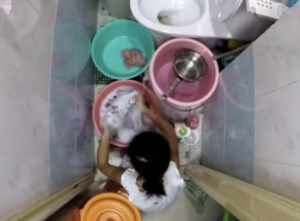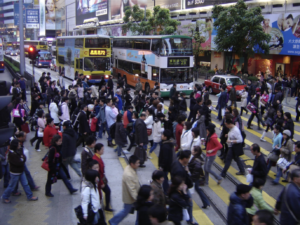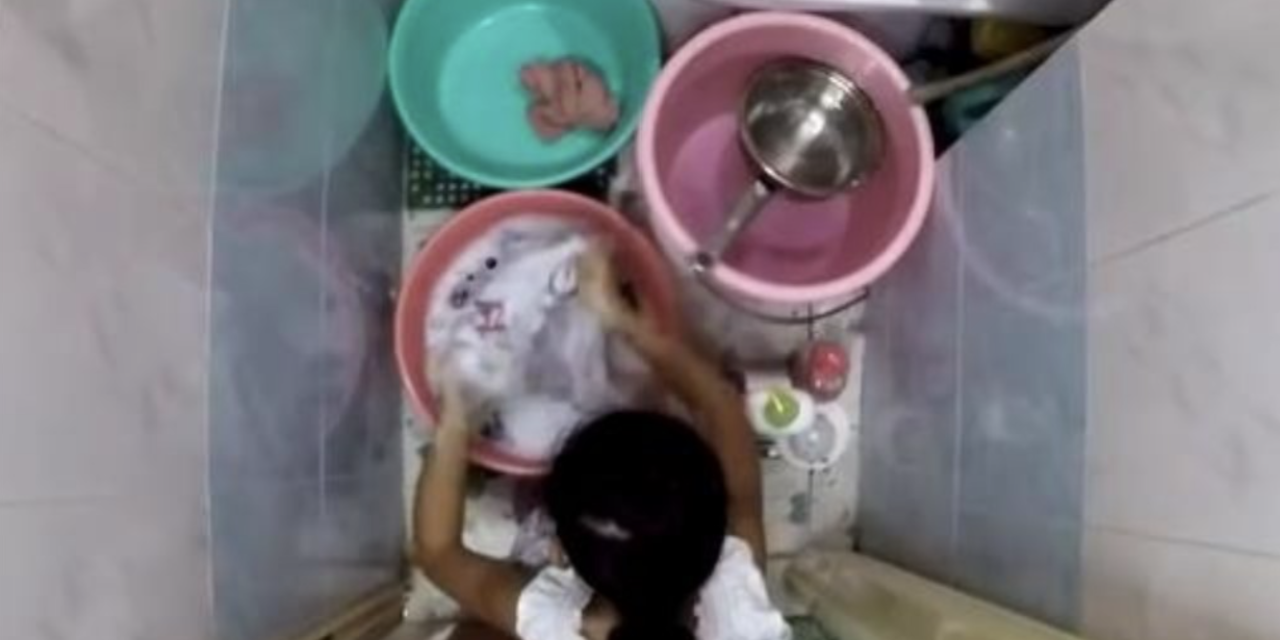By Leon Wang Zhenglang
HKU Journalism and Media Studies Centre
From the moment her eyes flutter open in the early morning, Linda’s day begins with an overwhelming sense of obligation. The first thing she does after getting up is to make breakfast for her mother and 6-year-old brother. Then she gets herself ready to leave the house, followed by hours of commuting to and from school. When she returns later that night, it is again her responsibility to prepare dinner for the whole family and tutor her brother with his homework. But it doesn’t end there. Linda’s evenings often include washing dishes, doing the laundry, and mopping the floor. On some days, she has to pick up her brother from kindergarten, when her mother is working.
Linda’s father is not in Hong Kong. It’s a daily struggle for her family of three to survive in this fifth-most expensive city in the world.
All of this would seem not worth mentioning if Linda had been an adult. The reality, however, is that she was 17 years old at the time, still a high school student who was struggling with intense pressure from school and taking care of her family at the same time.

Caption: A young girl in Hong Kong doing the laundry in the bathroom
(Screenshot taken from TVB Sunday Report ‘小小家長’ Oct. 13, 2019)
Unheard voices
Youngsters like Linda, who share similar struggles with balancing personal lives and taking care of their families, are known as “young carers.” Linda’s story and stories like hers were told to HKU Journalism by the Society for Community Organisations (SoCo), which has tried to help young carers in Hong Kong. In 2021, SoCo published an extensive report on the needs of young carers. For privacy reasons, SoCo did not reveal Linda’s full name.
Sze Lai-shan, the deputy director of SoCo and the leading researcher of the study, said that the issue of young carers in Hong Kong has been an ongoing situation for a long time.
“We’ve noticed that children from poor families often tend to take on family responsibilities at a very young age,” said Sze. “Some children might have to do household chores, take care of their younger siblings, or even their parents who have some kind of illness.”
To urge the Hong Kong government to offer better support for the estimated thousands of young carers in the city, Sze and her colleagues proposed a number of recommendations, including calling on the authorities to establish policies and community centres that specifically target this category of children.
However, three years have passed since their report was published, and nothing has changed. The Hong Kong government has not responded to any of SoCo’s suggestions, according to Sze.
Although the Legislative Council attempted to promote”’carer-centric” policies in 2023 to put more effort into the issue of adult carers, young carers, as a specific category of disadvantaged children, still face the reality that society lacks enough public awareness and systematic support for them in Hong Kong.
Thus, for the thousands of young carers in Hong Kong like Linda, their long days without relief or support are likely to continue.
Hidden from plain sight
Young carers, according to British scholar Saul Becker’s definition in 1998, generally refer to children or teenagers aged under 18 who take on the physical or mental responsibility of caring for someone, usually their family members, for various reasons.
Since the concept was introduced, Western societies have begun to see it as a major social issue. In the United Kingdom, for example, the 2021 Office of National Statistics census reported around 120,000 young carers aged from 5 to 18 in England, while the school census in 2023 suggested that there were 39,000 “known” young carers in the country. In the United States, an estimated 5.4 million children were classified as unpaid carers for family members before 2019, according to a 2021 report by the American Society on Aging.
In Hong Kong, however, the Census and Statistics Department does not yet provide any official numbers of young carers, as children taking care of adults has not been classified as a distinct category in any governmental reports on carers. But there was a possible way to estimate the numbers from one of the key findings in the SoCo’s study.
In the report, Sze and her research team found that over 80% of children from low-income families in Hong Kong must do a certain amount of housework or take care of their family members. According to the Hong Kong Poverty Situation Report, the child poverty population in Hong Kong was about 274,900 in 2020, in a total children population of 1.02 million. Based on SoCo’s findings, that would mean nearly 220,000 children—or one in five children in Hong Kong—are young carers.
The most common cause for their situation is when an older family member experiences a disability or illness, and care falls to a younger relative. Sometimes, poverty is the reason, as in Linda’s case, where her family could not afford domestic help. The other major category, which, according to social welfare research, has been increasing in recent years is children taking care of their parents suffering from mental illness.

Pedestrians walking in Causeway Bay, Hong Kong
(“People in hong kong”, by Mr Drake, licensed under CC BY-SA 3.0)
‘The burdened hearts’
Alan Tam, 35, a Ph.D. student in Social Welfare at The Chinese University of Hong Kong, has studied the issue of young carers in Hong Kong for six years. As a former young carer who cared for his mother with depression, he focuses more on the relationship between children and their parents suffering from major depressive disorders (MDD).
Speaking from his own experience and research findings, Tam said that parents with depression will encounter a loss of parenthood, meaning they can no longer perform the parental role normally in the family, leading children to be “parentified” and thus become young carers.
“The parentified child usually takes instrumental roles and emotional roles, and sometimes, in the context of parental mental illness, they assume some nursing roles,” said Tam. “Adolescents also take up, shoulder various tasks of parental roles, including soothing their parents with MDD; also, sometimes they have to accompany their parents to have medical consultations.”
In the report, SoCo also found that young carers spend an average of 10 hours each week on care work, with over one-third of them needing to work at least eight hours or more each week. Although children taking care of their families may sound natural or even ideal, scholars like Tam have found that excessive caring work at an early age will pose a severe threat to children’s physical and mental well-being.
“Some of the adolescent respondents claimed that they could not concentrate during their daily lives. They also experienced tons of emotional flows, including happiness, fear and being overwhelmed,” he said. “On some occasions, they may experience critical incidents such as aggression among their parents with MDD towards themselves, or even a ‘life or death’ issue as their parents may have experienced suicide attempts.”
Similar scenarios have happened to Tam as well. When he was still a junior in secondary school, his mother disappeared for an entire day after having an argument with his older brother. Tam and his siblings were terrified, confused about what was happening to her, and desperately searched the district around their home, hoping that she was safe.
Although Tam was hesitant to share his feelings, after 20 years and, with his mother’s passing, he said that day is still vivid in his mind.
Striving for change
To improve conditions for young carers, several Western nations have enacted policies and other support mechanisms over the past decade.
The United Kingdom introduced The Children and Families Act in 2014, which legally defined young carers and significantly strengthened their rights through intervention from local councils and offering support with collaborations from NGOs. In France, schools organise universal services for before- and after-school care for all school-aged children, relieving parents from the stress of looking after their children and providing a space for adolescents to relax and study. In terms of economic aid for young carers, the Australian government has established the Young Carer Bursary Program to support their education, offering 1000 bursaries of A$3,000 (HK$16,000) each year.
In Asia, the idea of filial piety has greatly affected the perception of children taking care of their families. It has been widely regarded as a virtue rather than being considered unpaid “shadow work.” But things have changed in recent years as more Asian countries have begun to see the importance of helping young carers, whose future development is at risk due to the overwhelming caregiving responsibilities.
Among Asian countries, Japan stands out. In 2021, the Japanese government established a special project team with the goal of raising public awareness of young carers and enhancing cooperation between educational institutions and government agencies to identify more young carers across the nation.
For Hong Kong, however, there’s still a long way to go.
Challenges to overcome
Jason Po, a mental health counsellor for children and youth who has been working at the Baptist Oi Kwan Social Service Centre for more than five years, said that support for young carers in Hong Kong was still not enough.
“Although children are at a young age, they will unconsciously take on the pressure of caring as well,” said Po. “I hope to see more attention paid to the emotional well-being of children from all over society, especially to young carers.”
As an experienced social worker, Po said he often found it very challenging for NGOs to identify young carers in schools or communities because most Hong Kong people are still unaware of the concept. Even former young carers like Tam said he only realised he was a “young carer” after studying social work at university.
Moreover, as Sze and her fellow social workers described in their report, a significant “service gap” exists in Hong Kong in terms of supporting young carers. At present, it is difficult to find more than a few NGOs in Hong Kong that provide specialised support for young carers, with Baptist Oi Kwan Social Service being one of them.
At the governmental level, despite the establishment of 19 Parent/Relative Resources Centres across Hong Kong by the Social Welfare Department in 2019, which are aimed at providing support to parents and relatives of people with disabilities, there is still a lack of specific policies that acknowledge young carers as a distinct group.
While the 2021 report on young carers hasn’t led to immediate changes by the Hong Kong government, Sze said that SoCo will keep track of the issue and provide further recommendations in the future. But most importantly, she said, the Hong Kong government should realise its capacity to solve this issue.
“It is mainly the government that has to do it because it holds the relevant information,” said Sze. “Of course, NGOs can also help to collect a certain amount of data, but only the Census and Statistics Department has the ability to conduct a census on the numbers of young carers.”
In addition to calling for more government support for young carers, Tam also said that the public should recognise the complexity of the issue rather than simplifying it from a single perspective.
“The children, the young carers did suffer. But on the same side, they could generate post-adversity growth, including that they have become more mature, become more considerate, and they have a higher ability of solving their problems,” said Tam. “So, I think that the focus should not be only on the bad side, but we can also focus on the good side in order to avoid the labelling or stigmatization of young carers in Hong Kong, or in whatever societies.”
Advisor: Jennifer Deayton

